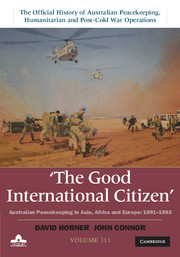Book contents
- Frontmatter
- Contents
- Maps
- Preface
- Chronology 1989–99
- Abbreviations
- Part 1 Strategy and policy
- Part 2 Cambodia
- Part 3 Western Sahara
- Part 4 Former Yugoslavia
- Part 5 Watch on Iraq
- 16 A new type of commitment
- 17 Disarming Iraq
- 18 A limited liability
- 19 Unscom and the US alliance
- Conclusion
- Appendix A United Nations Security Council resolutions
- Appendix B Major office bearers, 1991–99
- Bibliography
- Index
- Plate section
- References
17 - Disarming Iraq
Sanctions and weapons inspection, 1991–92
from Part 5 - Watch on Iraq
Published online by Cambridge University Press: 12 May 2022
- Frontmatter
- Contents
- Maps
- Preface
- Chronology 1989–99
- Abbreviations
- Part 1 Strategy and policy
- Part 2 Cambodia
- Part 3 Western Sahara
- Part 4 Former Yugoslavia
- Part 5 Watch on Iraq
- 16 A new type of commitment
- 17 Disarming Iraq
- 18 A limited liability
- 19 Unscom and the US alliance
- Conclusion
- Appendix A United Nations Security Council resolutions
- Appendix B Major office bearers, 1991–99
- Bibliography
- Index
- Plate section
- References
Summary
As the first glimpse of daylight appeared over Baghdad at 5am on 24 September 1991, two Australian Army officers, Major Colin Chidgey and Captain Brad Hampton, gathered with other officials in the car park of the Iraqi capital's Palestine Hotel. It was just seven months since the end of the Gulf War, and they were part of a forty-four-member nuclear weapons inspection team formed jointly by the International Atomic Energy Agency (IAEA) and the United Nations Special Commission on Iraq (Unscom). The latter organisation had been set up in May 1991 to implement UN Security Council Resolution 687, directed towards the abolition of Iraq's weapons of mass destruction (WMD).
The team leader, Dr David Kay, an experienced American IAEA inspector, issued his instructions. Chidgey, a 36-year-old Portsea graduate and Royal Australian Engineers officer, with extensive training in explosive ordnance disposal (EOD), was to command a search team and was the mission administration officer. Hampton, aged 30, and also a Portsea graduate and EOD specialist, was to command the security team (armed only with torches) and to assist with team administration. The previous night Kay had briefed his key staff but, to prevent his plans leaking to the Iraqis, most team members received their orders only that morning. The Iraqi escorts – the minders – who joined them that morning were also unaware that the target was the headquarters of the Iraqi Petroleum Company, thought to be a cover for a nuclear weapons program, and located almost opposite the Palestine Hotel (see map 21).
- Type
- Chapter
- Information
- The Good International CitizenAustralian Peacekeeping in Asia, Africa and Europe 1991–1993, pp. 427 - 462Publisher: Cambridge University PressPrint publication year: 2014



